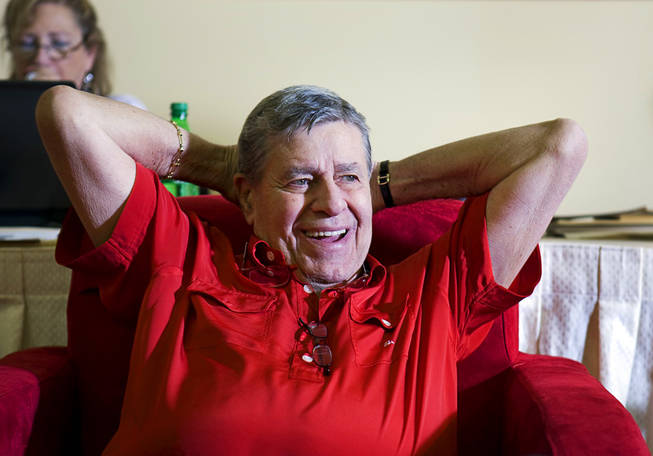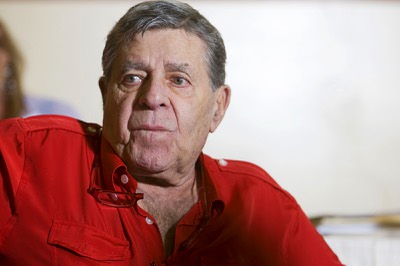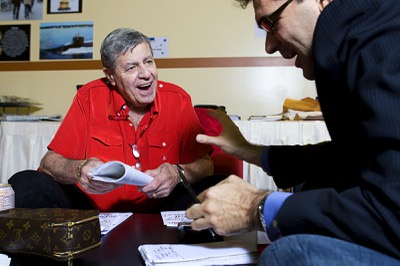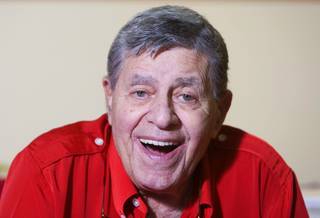
Entertainer Jerry Lewis, Muscular Dystrophy Association national chairman, relaxes during an interview at the South Point Tuesday, Aug. 31, 2010. The 2010 Jerry Lewis MDA Telethon starts Sunday at 6 p.m. and concludes on Labor Day at 3:30 p.m. MDA is the nonprofit health agency dedicated to curing muscular dystrophy, ALS and related diseases by funding worldwide research.
Thursday, Sept. 2, 2010 | 11 p.m.

Entertainer Jerry Lewis, Muscular Dystrophy Association national chairman, makes a face to the camera during an interview at the South Point Tuesday, Aug. 31, 2010. The 2010 Jerry Lewis MDA Telethon starts Sunday at 6 p.m. and concludes on Labor Day at 3:30 p.m. MDA is the nonprofit health agency dedicated to curing muscular dystrophy, ALS and related diseases by funding worldwide research.

Entertainer Jerry Lewis, Muscular Dystrophy Association national chairman, is shown during an interview at the South Point Tuesday, August 31, 2010. The 2010 Jerry Lewis MDA Telethon starts Sunday at 6 p.m. and concludes on Labor Day at 3:30 p.m. MDA is the nonprofit health agency dedicated to curing muscular dystrophy, ALS and related diseases by funding worldwide research. STEVE MARCUS / LAS VEGAS SUN

Entertainer Jerry Lewis, Muscular Dystrophy Association national chairman, is interviewed by John Katsilometes during an interview at the South Point Tuesday, Aug. 31, 2010. The 2010 Jerry Lewis MDA Telethon starts Sunday at 6 p.m. and concludes on Labor Day at 3:30 p.m. MDA is the nonprofit health agency dedicated to curing muscular dystrophy, ALS and related diseases by funding worldwide research.
Beyond the Sun
I'm seated on a soft sofa upholstered in cushy red fabric, sipping from a cold can of Diet Sunkist.
And Jerry Lewis is yelling at me.
"I can't talk to you if you're not looking at me! OK? You need to look at me when I'm talking to you, OK, John!"
Yes, long before anyone ever coined the term, "shout-out," Jerry Lewis mastered the verbal form.
It's not an angry yell, either. There is something happy and high-spirited about the way Jerry Lewis shouts across the big convention room at South Point hotel-casino, which has been converted into the nerve center for this weekend's "Jerry Lewis MDA Telethon," which runs from 6 p.m. Sunday through 3:30 p.m. Monday (KTNV Channel 13).
"Where was I!? Now I forgot what I was going to say," Lewis continues. "You have to be careful when you're 84. You can't remember everything."
Lewis' brain focuses on multiple chores and ideas at once, ping-ponging from topic to topic so rapidly that even he can't keep pace.
"In truth, I can't really concentrate on what I'm doing now," he says. "I'm making an edit, in my edit bay, right now. While sitting with you, I'm making that cut. While we're talking, I'm making the cut in my head."
What has led to the cheery outburst is my checking a little digital recorder. Earlier, Lewis had grabbed the gadget and said, "What's this, a razor? Hmmmmmm!" pretending to shave his face.
We'd covered ample territory to this point. Lewis says it was important that the telethon has moved back to Las Vegas from a 12-year run in Hollywood.
"This is the Entertainment Capital of the World!" he says, ready to qualify that title. "At least, it is unless you're watching a naked woman dancing in a bathtub of borscht!"
The iconic filmmaker, movie star and stage performer has little use for the prevailing entertainment company in Las Vegas, Cirque du Soleil.
"I've seen all that Cirque du Soleil has and no one Cirque show is better than the other," he says. "But Cirque is a cop-out. What's been lost is showmanship — showmanship is the key word in this story!"
The master showman — a true living legend by anyone's assessment — relishes being the center of attention, whether onstage or in this archaic workspace where shout-outs have supplanted texts and where two electric typewriters share space with assorted laptops.
Jerry Lewis, today at age 84, has little to prove to anyone and is in fine condition, wearing dark drawstring pants and a cherry-red, button-down red shirt with "J.L." stitched into a pocket. His hair shows the grooves of a fresh combing, and his eyes dart around the room.
It's worth noting his physical well-being. For most of his life Lewis has lived with sometimes paralyzing spinal pain (he's had a neurostimulator implanted in his back to help relieve the discomfort). He has overcome a long battle with pulmonary fibroses, and has been weaned off a steroid — prednisone — that years ago left him bloated and addicted. He has suffered two heart attacks, the most recent a "mild" scare in June 2006.
But today, Lewis is bounding with zeal, and clearly unconcerned about the consequence of his words. His comment that God wasted a certain female reproductive organ on Joan Rivers is not a fresh perspective, given his previous statements about women comics (he has said that he finds them all unfunny). But Lewis' high-volume delivery, offset by a deadpan expression, still catches you unexpectedly.
"Do you understand what I'm saying, John!?" he calls out, staring until you stare back.
Lewis rolls along, carving his own verbal path. He has a long history of criticizing the way resort companies do business on the strip. He's never stepped into any CityCenter hotel and has no plans to play tourist at the MGM Resorts masterpiece. Marking the city's downward turning point as the era when Howard Hughes began purchasing hotel-casinos, Lewis says the new Vegas resorts are too large, to beholden to the bottom line, too impersonal.
"I would sit with every executive and say, 'Here's how you do it (slaps hands)! Do not charge $79 for a room! You're supposed to charge $290 for a room!" he says. "To put one up at that size, that cost — $79? What the (expletive) is good that costs nothing? Why would it cost nothing? You can't do that (slaps documents against the coffee table in the temporary living room that has been set up for him to do business). Keep that price right, but treat the people right, and tell them, 'Don't come in a car, because we don't have a place to park it.' ah-hem!
"Everybody's got two businesses — their own and show business. And I'm saying call on that second position and fix the town!"
Lewis loves showmanship, but this year's show is devoid of the kind of mega-stars featured on the telethon a generation ago. There are many familiar names, yes, and even a few genuine superstars. Barry Manilow, for instance, is to be featured. David Archuleta, Richard Belzer, Carrot Top, George Wallace, Enrique Iglesias and Taylor Dayne are on the bill.
What are the criteria for an entertainer to appear on the show?
"You just need to be a good performer (chuckle)," Lewis says. "It used to be, who is the biggest name? One show I had Jack Benny, Red Skelton and Danny Kaye, Danny Thomas, George Burns and Wayne Newton, and on and on and on and on."
Here comes the fire.
"But now, if you ask me, who is the biggest star? It has not changed! It is still my kids!" Lewis says, his voice again booming in symphonic oratory. "They were the star of the show from the beginning. This is my 60th time, six-oh, and I've never seen that change!"
Indeed. The days when the show was an all-star event from beginning to end are long gone.
"People are not tuning in to see famous people on the telethon, which is what we used in the first 20 years. With today's television sets in the home, you've got 700-800 channels of material," he says. "This program should've gotten an Emmy for being the longest show ever (laughs), but what it does is incredible. I have seen it grow."
Lewis is then interrupted by a woman dropping off an updated list of performers, which Lewis plucks from her hand and quickly reads.
"Now! Where were we? I forgot what we were talking about."
We were talking about how the kids were the stars of the show, all the changes you have observed …
"Wait, wait! Waitaminnit! John! I want you to hear this. At 84 I started to tell people a story, and being a performer you embellish it," he says. "You try to open up the story and then finish it. I'm doing such a long setup, that I'm forgetting the finish! So I'm telling everybody what I want to tell them with the finish first! Go ahead, John. Go ahead."
So I ask, "Because the telethon has been so closely branded to you, and you to it, what happens at the point where you are going to have to turn this over to someone else? How much do you think about that?"
The symphony pauses, and for a moment Jerry Lewis is quiet.
"I think about it all the time," he says.
"What's going to happen?" I say.
"I don't know. I think we have built the right machine. I'm grateful for that," he says as he knocks three times on the table, a coincidental reminder of a song by Tony Orlando, one of the celebs often mentioned as his telethon successor. "I think that machine will prevail, whether it will prevail at the hands of one fearless leader, or as they call me, 'The Commander,' or will the machine continue to help my kids, we'll see."
Then Lewis unexpectedly revs up again, shouting across the room to passers-by, "Hey, sweet face!" to a female staffer, then. "Hey, Artie!"
Artie, who is show director Arthur Forrest, shouts back, "What! Didn't you say, no yelling!?"
"Where's Lee?!" Lewis asks.
"I don't know!" Artie shouts.
"Go ahead, John," Lewis says, refocusing on the conversation.
"You had said, it might be one fearless leader or a number of individuals who take over for you," I say.
"It's not my place to even talk about it. That's something that will have to be dealt with," he says.
I ask, "Is it painful to think about the time you won't be at the front of this cause?"
Another pause.
"It's painful that I'm not going to see my wife and my daughter when that happens. That's the first pain," he says. "The second pain is, I would love to have been there when we get the answer, and to be able to walk out on that stage and say, 'Folks, you want to know what you've done?' Whew. It'll happen. It'll happen."
The thought brings to mind the man who cured polio, and his advice to Lewis.
"The long talks I had with Jonas Salk, you know, he talked to me about patience," Lewis says. "He talked to me about having that focus directed at that end result, and to go for it. And that's what he did, and children today don't fear polio. It happened. It can happen."
Lewis is aware that, after raising more than $2.4 billion to fight the fatal disease that kills muscle-controlling nerves in children, viewers will wonder just when a cure will be found.
"People are going to be watching the show and saying, 'Jesus Christ! I've been sending him money for 60 years! Why don't we have it fixed?'" Lewis says. "Hey, I'm trying, folks! I hate to come back as an annoyance, but we have to come back one more time."
The 2009 show marked just the fifth time in the telethon's history, which officially dates to 1959, that the MDA effort fell short of the previous year's total.
"It was frightening," Lewis says. "The downturn happened just a couple of months before the show. So I thought in terms of, it's going to be a downturn for everyone else, but not me. So I did $61 million instead of $63. That's OK for me, and that's OK for my kids"
And this year?
"This telethon is going to make more money than it's ever made, and the audience is going to go nuts. They're going to go bananas," he says. "I'll go off the air with maybe ... $70 million (puts his hands over his face). The terrible thing is, if I'm wrong, it will probably be $40 million. That high, or that low. No middle. It'll either be a bombastic $70 million and we'll spend the whole year telling the press how we did that, or bang! It'll be $40 million.
"But if I had $40 million, how can I complain, really?"
He can't really, and he laughs. And with Jerry Lewis, you have to do that. You have to laugh.
Follow John Katsilometes on Twitter at twitter.com/JohnnyKats.



Join the Discussion:
Check this out for a full explanation of our conversion to the LiveFyre commenting system and instructions on how to sign up for an account.
Full comments policy